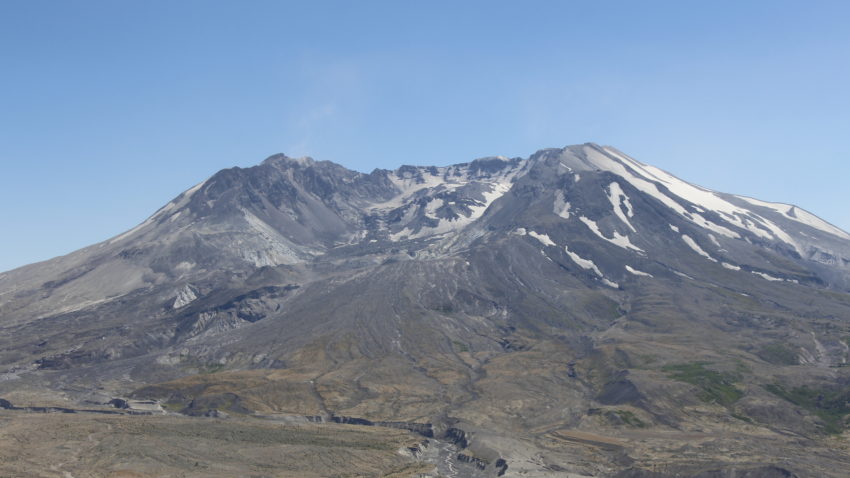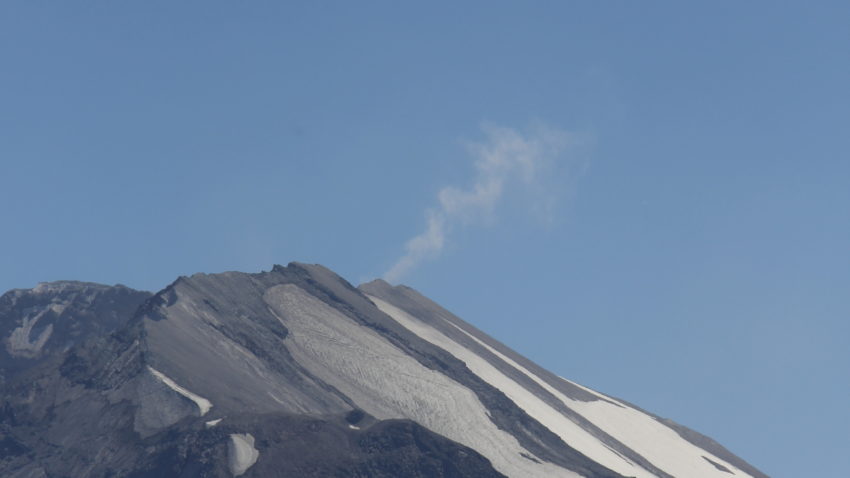
Perhaps the recession we are entering into should be called the “Mount St. Helens” Recession.
Mrs. C. suggested this to me on one of our walks this past week. When she said that the events surrounding the 1980 eruption reminded her of the current state of the world, I knew it was the perfect metaphor for our current and future economic conditions.
A History Lesson
Although us older folks remember the eruption of Mount St. Helens like it was yesterday, many of you were probably not around when this volcano erupted in Washington State forty years ago.
Scientists saw signs that Mount St. Helens was coming to life years before it erupted. However, concerns heightened in 1980 when the mountain’s activity created thousands of small earthquakes. Then the volcano began to change shape. The movement of magma upward created a huge bulge on the side of the mountain. As the mountain came to life, it spit out steam and ash. As the earthquakes and small eruptions intensified, experts predicted an eruption was imminent. They could not, however, predict the exact time and date.
On May 18, 1980, a massive earthquake from deep within Mount St. Helens caused a huge landslide on the north side of the mountain. The landslide was followed by a lateral eruption that sent gas, rock, and ash out at over 600 mph, devastating an area of 230 square miles.
The lateral eruption was unusual, so dozens of people who were observing the volcano or just waiting it out in an area they assumed was a safe distance were killed by the blast.
After salvaging much of the lumber leveled by the blast, officials decided to let nature take its course and heal the landscape. Over the coming years, vegetation grew back, animals returned, and the lakes and rivers that had been choked with mud and debris returned. For a detailed history of this event, see this link to The History Channel’s website.
The Lessons for Today
As evidence showed that an eruption of the volcano could happen at any time, people were warned or given precautions to take – some listened, some chose not to.
Just as the days, weeks, and years before Mount St. Helens erupted, we had signs that we might face a crisis. Epidemiologists warned of a possible pandemic. Economists insisted that the economic boom that we faced was becoming fragile and unsustainable. But just as with Mount St. Helens, nobody could have predicted when things would turn, nor the immediate devastation that would result.
The coronavirus pandemic seemed to come out of nowhere. We were living our lives, planning for our spring breaks, starting new businesses, getting ready for new careers, and then suddenly everything catastrophically changed in what seemed like an instant.
The landscape after the eruption of the volcano looked like a moonscape. How could it ever return to normal after such devastation?
And yet, it did return. Not exactly like it was before, but it did return to a thriving ecosystem, and much more quickly that many experts predicted. It showed the resiliency of nature.
If we let things take their natural course, our society and economy will come back. Not quite like before. Hopefully, through all of us working together, it will be a bit better. Consumers will begin to spend again. Small businesses will start back up. Entrepreneurs will find new opportunities in the ashes of this recession.
A Note of Caution
One of the lessons of Mount St. Helens is that something like its 1980 eruption will come again, if not on that mountain, on one of the string of volcanoes that make up the part of the ring of fire circling the Pacific Ocean that cuts across the Western US. It may not come for many decades or even centuries, but it will happen again.
My parents and grandparents never forgot the lessons of the Great Depression. They tried to pass them along, but over the generations, memories faded. None of us alive today will ever forget these challenging times. But to our grandchildren and grandchildren’s children, the events of 2020 will just be a vague part of history.
Let the wafts of steam that still come out of Mount St. Helen today act as a warning: sometime in the future, generations to come will also face devastating events in their lives.
But just as nature is resilient, so are we.

Photo credits: Jeff Cornwall

I really appreciate the sentiment of Mount St. Helens. I am always one for a metaphor, especially in the face of circumstances that feel surreal and indescribable. I do believe that better things will come again and the analogy of Mount St. Helens draws a compelling question to my mind: how can we better prepare for the unknown catastrophes to come? I think this question is not entirely answerable; there will always be unknown events lingering in the future. However, I believe that moments like these, when everything feels so unfamiliar, are lessons for our future selves to remain cautious and prepare for what we do not anticipate.
I thought that this was a fascinating connection to history and what is happening in our world today! Certainly not one I would have come to on my own. I think it is important to remember during this time as you said that no one knew just how devastating this pandemic was going to be despite the fact that we predicted it would hit. There have many discussions in the media about what we should or should not have done, mistakes that have been made, but I know the mindset I have been attempting to keep is that hopefully at the end of this we will feel as if we did too much rather than too little. It is also a refreshing viewpoint to focus on the fact that things will return to normal eventually. Our nation is one that has survived plagues and economical disasters, but it is interesting from my point of view to finally be old enough to see just how much this pandemic is affecting every industry in our world. There is no doubt that the situation in its entirety was unprecedented, and along with others I know that I pray every night on the return to normal that will hopefully occur somewhat soon.
The amount of similarities between the Mount St. Helens’ recession and this coronavirus recession is a tad nerve-wracking. Much like the moonscape mark the eruption made, I agree that our economy and society will eventually bounce-back, in due time. However, I respectfully disagree with your statement that the pandemic came out of nowhere because the staggering numbers of the Coronavirus in Italy and China were America’s warning to take precaution; but we did not listen. As you mentioned in your Resolve post, these types of recessions, Mount St. Helens, the Great Depression, the 9/11 Recession, etc are all meant to teach us valuable lessons on how to handle and adapt when life throws major curveballs.
I really like the Mount St. Hellens metaphor for this situation, because it really emphasizes peoples blindness to the event we are in. The fact that many individuals are still going outside and not social distancing, spreading the virus and causing the United States to have the highest number of cases of the virus in the world reminds me of the part you mentioned of the people standing watching the eruption thinking they are safe and then dying due to the blast. I just wish there was a way more people would realize these events are coming and better prepare for them. I read a post on facebook where a book was written in the 1980s and it detailed how in the 21st century, specifically the 2020s a respiratory virus would come from China and sweep across the world creating a pandemic. How someone was able to predict this nearly 40 years ago is astonishing to me and that relates solely to Mt. St. Helens in that we knew about it, but did nothing to prepare. Hopefully this virus serves as a reminder to all that we are not as prepared for anything that we think we are.
Although I, like many, continue to be frustrated by the standstill of an otherwise very busy life… this season has provided the most wonderful reminder that we, as human beings, are a part of a larger ecosystem. Perhaps when we begin to find our new normal, we will do so with the knowledge that during this time, our earth began to heal, our values shifted, our notion of time was rearranged. Just like the world we are resilient and perhaps it was time to remember our connections to one another and the earth itself. I wonder often how we will remember this time, how it will be told, which parts will be added to the history books… however, I am reminded by this post and many others that it us who will construct this narrative. And we are responsible for teaching future generations about the great pause with all its hardships, fallout’s, and wonders.
What a great comparison to describe the current state of our world! We have so much to learn amid the craziness and catastrophes we face. My mom always told me, “those who don’t learn from history are bound to repeat it.” In fact, my great grandmother lived through the depression and really drilled into her children, including my grandpa, the value of money as well as the need to be prepared for the next time something went wrong. That lesson passed from my grandpa to my mom in the form of keeping an adequate supply of food, cleaning supplies and personal hygiene products in the basement in case tragedy strikes. We have so much to learn from the people and events that came before us. Hopefully, we will see a positive bounce back soon!
Hey Professor, I really loved the analogy to Mt. Saint Helens. As a volcano nerd, you and your wife’s analogy really hit him. As well as the “warning” part of the analogy, I would like to add that like Mt. Saint Helen’s, the landscape of the world will never be the same. We will have to get used the new world we must live in, much like how the people of Washington will have to get used to a topless Mt. Saint Helen’s. Great Post.
In December of 2019 I thought that the media was making covid a bigger deal than it was. I would say that I would be someone who thought I was fine when Mt. St Helen’s was expected to erupt. As time has passed, I understand now that some people have been really sick and others have been perfectly fine, but for the best interest of the world, those who were more sick were the ones whose story was told.
I think we all know we should listen to the precaution and knowing that their was possible threat of a pandemic. Then here comes coronavirus out of nowhere which people say, but most of us could see it. coming within months of things deteriorating. Im thankful our country is starting to look and feel back to normal because let me tell you I don’t want to raise kids nor have my family in these crisis’s anymore due to economically and politically problems.